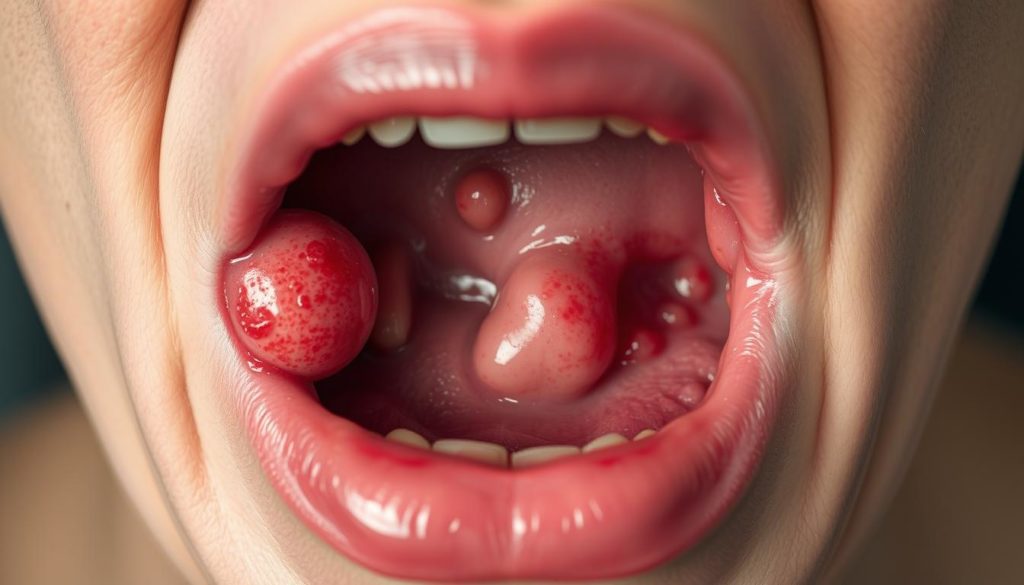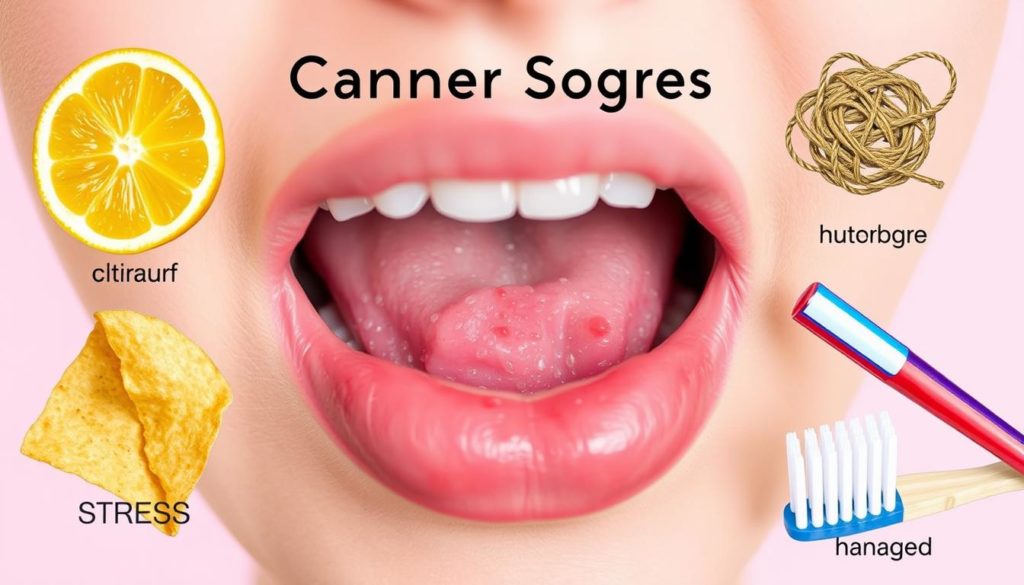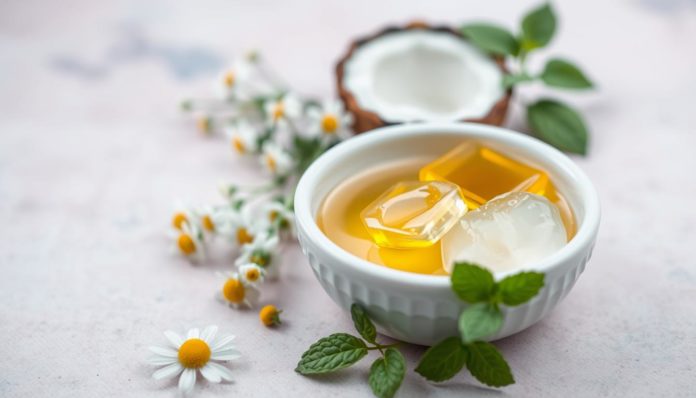Nearly 20% of people in the U.S. get canker sores at some time. These sores make eating, drinking, and talking very painful. Knowing how to prevent canker sores and finding canker sores relief can make life better.
Looking for quick mouth sore relief or a way to stop sores for good? It’s key to know what causes them and how to treat them. This article gives you tips and ways to avoid and handle canker sores. Your oral health and comfort are important.
Keep reading for helpful advice on dealing with canker sores. With this information, you can fight canker sores and keep smiling without pain!
Understanding Canker Sores and Common Symptoms
Canker sores, known as aphthous ulcers, hurt the soft tissues in the mouth. It’s key to know the mouth ulcers symptoms for effective management. Learning how to identify canker sores is helpful.

Key Symptoms of Canker Sores
Canker sores come with clear symptoms:
- Painful, round or oval sores in the mouth
- They have white or yellow centers and red borders
- Causing discomfort when eating, speaking, or swallowing
Types of Canker Sores
We categorize canker sores by size and healing time. Learn the main types:
- Minor Canker Sores: These small, round ulcers heal in 1-2 weeks, leaving no scars.
- Major Canker Sores: Bigger, deeper sores that may need up to six weeks to heal, possibly leaving scars.
- Herpetiform Canker Sores: A cluster of tiny sores that might join into a larger ulcer and heal in weeks.
Knowing these types of canker sores aids in correct canker sore identification and treatment.
Common Causes of Canker Sores

Canker sores are small, painful ulcers. They make eating and talking tough. Knowing what causes these sores can help you manage and avoid them.
Dietary Triggers for Canker Sores
Your diet is a key factor for mouth sore causes. Some foods are known to trigger sores. This includes acidic fruits and spicy meals. Foods that are hard or crunchy can also hurt your mouth, making sores more likely.
- Acidic fruits (e.g., lemons, oranges)
- Spicy foods (e.g., jalapeños, hot sauce)
- Rough foods (e.g., hard chips, crusty bread)
Stress and Canker Sores
Stress plays a big role in causing canker sores. The stress from daily life can lower your immune defense. This makes you more likely to get oral ulcers triggers. Stress doesn’t cause the sores by itself, but it can make things worse.
Genetic Factors
Research shows genetics matter in canker sore reasons. If your family has a history of canker sores, you might too. It means some people naturally get these sores more often than others.
| Trigger Type | Examples | Impact |
|---|---|---|
| Dietary Triggers | Citrus fruits, spicy foods | Increases irritation and ulceration |
| Stress | Emotional, daily pressures | Weakens immune response |
| Genetic Factors | Family history | Higher susceptibility |
Effective Canker Sore Treatments
Dealing with canker sores can be a real pain. But, many treatments are available to help. These options ease the discomfort and help heal faster.
Over-the-Counter Solutions
For canker sores, over-the-counter products are a good first step. You can use topical agents, mouth rinses, and oral medications. They offer quick relief and help by shielding the sore and lowering swelling.
- Topical anesthetics like benzocaine can numb the pain.
- Antimicrobial mouth rinses help keep sores clean.
- Anti-inflammatory gel applications reduce redness and swelling.
Home Remedies to Try
Prefer natural remedies? Many home treatments work well for mouth sores. And, you probably already have what you need at home.
- Rinsing with saltwater can reduce bacteria and promote healing.
- Applying honey has antimicrobial properties and soothes irritation.
- Using a baking soda paste can neutralize acids and relieve pain.
- Avoiding spicy and acidic foods can prevent further irritation.
When to Seek Medical Help
Some canker sores don’t go away on their own. In these cases, seeing a doctor is a smart move. Look for help if:
- Sores persist for more than two weeks.
- Pain is unmanageable despite using oral ulcer medication.
- You experience frequent flare-ups or unusually large sores.
- Sores are accompanied by a high fever or other concerning symptoms.
Knowing when to see a doctor is key. It makes sure you get the right treatment. And, it checks for any serious health problems.
Best Practices for Canker Sore Prevention
Stopping canker sores is easier with good advice. Keep your mouth healthy to avoid sores and improve well-being.
Dietary Recommendations
What you eat is key to avoiding canker sores. Add certain foods and cut out others to lower your risk. Here are tips on what to eat:
- Incorporate Foods Rich in Vitamins: Choose foods full of vitamins B12, C, and zinc. Eat oranges, strawberries, and greens like spinach.
- Avoid Trigger Foods: Stay away from spicy, acidic, and salty items. They can irritate your mouth.
- Stay Hydrated: Drinking lots of water keeps your mouth healthy and helps prevent sores.
Good Oral Hygiene Habits
Great oral hygiene stops canker sores. Try these tips:
- Brush Regularly: Use a soft brush to clean your teeth twice daily without irritating gums.
- Floss Daily: Floss to get rid of food and plaque that can cause sores.
- Use Mouthwash: Antimicrobial mouthwash can clean your mouth and lower ulcer risk.
- Avoid Oral Injury: Be careful not to bite your cheeks or lips when eating.
Managing Stress
Stress can cause canker sores. Managing your stress is key. Try these ideas:
- Practice Relaxation Techniques: Do yoga, meditate, or breathe deeply to lower stress.
- Regular Exercise: Working out is a great stress reliever and boosts health.
- Prioritize Sleep: Enough sleep each night helps your body handle stress better.
Follow these best practices to fight off canker sores and keep your mouth healthy.
Differences Between Canker Sores and Cold Sores
Many people mix up canker sores vs. cold sores because they look alike. But, it’s key to know how they differ for the right care. Here are the main differences.
Canker sores show up as small, shallow spots in your mouth or at the gum’s base. They don’t spread since they’re not caused by the herpes simplex virus. These sores are usually oval, with a white or yellow middle and a red edge.
On the other hand, cold sores come from the herpes simplex virus. They pop up outside the mouth, mostly on the lips. Cold sores spread easily. They start as blisters and then dry up into a crust.
| Feature | Canker Sores | Cold Sores |
|---|---|---|
| Location | Inside the mouth | Outside the mouth, typically on lips |
| Contagious | No | Yes |
| Appearance | Oval/round, white or yellow center | Fluid-filled blisters |
| Cause | Unknown, not herpes simplex virus | Herpes simplex virus |
| Treatment | Topical pastes, oral rinses | Antiviral creams, oral medications |
Treating these mouth issues takes different approaches. For canker sores, topical pastes or mouthwashes can ease pain. Cold sores need antiviral creams or meds, because they’re caused by a virus.
Knowing the differences between canker sores vs. cold sores is vital. With this knowledge, you can treat and prevent them correctly. This lowers the risk of getting complications from the wrong treatment.
How to Alleviate Pain from Mouth Sores
Mouth ulcers can be quite painful, making everyday tasks hard. Luckily, there are ways to ease this discomfort. Below are some key strategies to lessen the pain from canker sores.
Topical Treatments
Applying treatments directly to the ulcer helps a lot. These treatments include:
- Numbing Agents: Benzocaine products can make the sore les painful quickly.
- Protective Pastes: A paste barrier can protect the sore from irritation.
- Anti-inflammatory Medications: Anti-inflammatory gels lower swelling and discomfort.
Nutritional Support
Eating right is key in easing canker sore pain and healing them:
- Vitamin B12: Important for new cell growth and helps mouth sores heal.
- Folate Supplements: They aid in fixing tissues and speed up healing.
Using these topical methods and eating the right nutrients can really help. They reduce pain and heal sores quicker.
Natural Remedies for Oral Ulcers
Looking for natural ways to deal with canker sores can be both gentle and effective. There are many methods, from herbal treatments to changes in what you eat and making sure you drink enough water. These steps can help heal and ease the pain of oral ulcers.
Herbal Treatments
Some herbs, like chamomile and lavender, are great for calming. Rinsing your mouth with chamomile tea can ease canker sore discomfort. Lavender oil, mixed with a carrier oil, can be dabbed on the sore. This helps lower inflammation and speeds up healing. Adding these to your oral care routine can really help.
Dietary Adjustments
What you eat plays a big role in keeping your mouth healthy. It’s important to avoid food that’s spicy, acidic, or hard. These can make canker sores worse. Eating foods high in vitamins and minerals helps heal faster. Yogurt and leafy greens are great for oral health.
Hydration and Its Importance
Being hydrated is key for a healthy mouth. Drinking lots of water keeps your mouth clean and lowers bacteria levels. It also flushes away irritants that might make canker sores flare up. Drinking herbal teas like chamomile or green tea adds extra soothing benefits and keeps you hydrated.
Long-Term Solutions to Prevent Recurring Mouth Ulcers
Chronic mouth ulcers can be a real pain. It’s important to find ways to keep them away for good. By following certain steps, you can cut down on how often they happen and how bad they get.
Monitoring Nutrient Intake
A balanced diet is key to stopping chronic mouth ulcers. Make sure you get enough vitamins and minerals. Vitamin B12, iron, and folic acid are especially important. They help keep those painful sores at bay.
It helps to keep an eye on what nutrients you’re getting. This can show if you’re missing something that’s making ulcers worse.
Maintaining a Healthy Lifestyle
Living healthy is crucial for avoiding chronic mouth ulcers. Exercise regularly and make sure you’re getting plenty of sleep. Managing stress levels also helps keep you healthy, which means fewer ulcers.
Don’t forget about keeping your teeth healthy, too. Seeing your dentist regularly is important. It helps catch any problems early on.
Addressing Canker Sores in Children
Parents and caregivers find managing children’s canker sores challenging. These ulcers cause a lot of pain. Knowing how to spot and treat them is important.
Spotting *symptoms* of canker sores in kids is key. Look for round, white, or yellow ulcers with a red outline. They appear inside the lips, cheeks, or on the tongue. Kids might have trouble eating, speak less, dribble saliva, or feel cranky.
When treating kids’ mouth ulcers, be gentle. Here are some effective strategies:
- Give them cold eats and drinks to ease the sore.
- Stay away from spicy, salty, or sour foods as they can hurt more.
- Use a soft toothbrush for their oral hygiene.
- Try rinsing with a mild saltwater blend for pain relief and to fight germs.
Sometimes, over-the-counter treatments for kids can help. Always check with a doctor to make sure it’s safe for them.
To prevent canker sores, teach your child not to bite their cheeks or lips. A good diet and lots of water are important too. Regular dentist visits can catch problems early.
Here’s a quick look at what causes canker sores in kids and how to treat them:
| Causes | Treatments |
|---|---|
| Viral infections | Oral rinses and antivirals (if prescribed) |
| Minor injuries | Cold compress and soft foods |
| Food sensitivities | Avoiding trigger foods, balanced diet |
| Nutritional deficiencies | Vitamin supplements (if prescribed), balanced meals |
By understanding how to tackle children’s canker sores, parents and caregivers can reduce their pain and speed up healing.
Nutritional Impact on Oral Health
Understanding the importance of mouth ulcer nutrition is key for good oral health. Not having enough vitamins and minerals can lead to problems like canker sores. Iron, zinc, and B vitamins are essential to avoid these painful sores.
To take care of your mouth, eat a well-balanced diet. Here’s a table that shows important vitamins and their roles in oral health:
| Vitamin | Role | Food Sources |
|---|---|---|
| Vitamin B12 | Aids in the regeneration of oral tissues, helps prevent mouth ulcers | Meat, dairy products, eggs |
| Iron | Important for immune function, reduces risk of oral ulcers | Red meat, beans, fortified cereals |
| Zinc | Maintains immune system function, helps prevent mouth sores | Shellfish, seeds, nuts |
Eating foods rich in these nutrients helps not only your overall health but your mouth too. Notice early signs of vitamin deficiencies and fix them by eating right or using supplements. This can lead to a healthier mouth and fewer canker sores.
Keeping a balanced diet for oral care helps keep your mouth healthy and sores at bay. Eating a variety of foods full of nutrients will improve your oral health over time.
FAQs: Expert Answers to Your Questions About Canker Sores
Dealing with canker sores can be tough, and you might have lots of questions. How long do they last? Typically, they can heal in 7 to 14 days. Smaller sores heal quicker than bigger ones.
Though they hurt, they usually don’t scar. Knowing how long they last can help you handle them better.
Many people wonder if canker sores are contagious. The answer is no. They aren’t caused by a virus, so they can’t be spread. This means daily activities remain safe without the worry of passing them on.
Being clear on the difference between canker and cold sores matters a lot. While both are painful, they are different in where they come from and how to treat them.
Another common concern is about what foods might make sores worse. Certain foods like citrus fruits, tomatoes, and some spices can trigger mouth ulcers. Eating a balanced diet and avoiding these foods can help cut down on sores.
Good oral hygiene and stress management also play a big part in keeping sores at bay. If you’re looking for a way to have fewer sores, checking what you eat and living healthy are good steps.
With this summary, you have a quick guide to the most asked questions about canker sores. It covers how long they last, their non-contagious nature, and what foods to avoid.
For any more questions, talking to a healthcare professional is a wise choice.
FAQ
What causes canker sores?
Canker sores can come from stress, certain foods, hormonal shifts, and small mouth injuries. Some folks might get them due to their genes.
How can I prevent canker sores?
To prevent canker sores, good oral care and stress management are key. Avoiding acidic or spicy foods helps too. Staying hydrated and eating a diet full of vitamins also aids prevention.
Are canker sores contagious?
No, canker sores can’t be passed from one person to another. They are different from cold sores in this way.
What are some effective treatments for canker sores?
Treatments include over-the-counter ointments and mouthwashes. Home remedies, like saltwater rinses or honey, are also helpful. For severe cases, seeing a healthcare professional is recommended.
How long do canker sores last?
Canker sores usually heal in one to two weeks. If a sore doesn’t go away after three weeks, it’s wise to see a doctor.
What foods should I avoid to prevent canker sores?
Try to stay away from spicy, acidic, or rough foods. Foods like citrus, tomatoes, and some nuts might trigger sores if you’re sensitive.
Can stress really cause canker sores?
Yes, stress plays a role in getting canker sores. Using relaxation methods, exercising, and getting enough sleep can help prevent them.
How can I alleviate the pain of canker sores?
To ease the pain, use topical treatments and avoid irritating foods. Drinking plenty of water and using pain relief medications can also help.
What’s the difference between canker sores and cold sores?
Canker sores appear inside the mouth and are not caused by the herpes virus. Cold sores are contagious, appear outside the mouth, and come from the herpes virus.
When should I see a doctor about canker sores?
See a doctor if sores are very big, hurt a lot, stick around for more than three weeks, or if you get them often.


